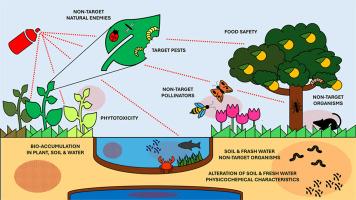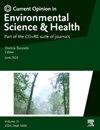Ecological costs of botanical nano-insecticides
IF 6.6
Q1 ENVIRONMENTAL SCIENCES
Current Opinion in Environmental Science and Health
Pub Date : 2024-09-07
DOI:10.1016/j.coesh.2024.100579
引用次数: 0
Abstract
Botanical nano-insecticides are a trend in pest control. The natural origin of the active substances, alongside with the methodological approach granted by nanotechnologies are a promising combination of innovation and eco-sustainability, hot topics in the context of ecological transition in agriculture. Nevertheless, their field application is still limited, due to production challenges and risk assessment concerns. Nanoformulations have some advantages over traditional bioinsecticides, including increased bioactivity and persistence, and slow-release rates. Recent research reported promising insecticidal activity of nano-emulsions, micro-emulsions, and nanoparticles loaded with different botanical extracts, oils, and essential oils. Though, despite their proven efficacy against insect pests and vectors, a limited number of studies investigated their safety towards nontarget organisms and fate in the environment. This mini-review provides an overview of the side-effects of botanical nano-insecticides and the main challenges to improve their sustainability in term of ecological and production cost.

植物纳米杀虫剂的生态成本
植物纳米杀虫剂是害虫控制领域的一种趋势。活性物质的天然来源以及纳米技术所提供的方法是创新与生态可持续性的有力结合,也是农业生态转型的热门话题。然而,由于生产方面的挑战和风险评估方面的顾虑,其实地应用仍然有限。与传统生物杀虫剂相比,纳米制剂具有一些优势,包括生物活性和持久性更强,释放速度更慢。最近的研究报告显示,纳米乳剂、微乳剂和纳米颗粒负载不同的植物提取物、油和精油,具有良好的杀虫活性。不过,尽管纳米乳剂和微乳剂对害虫和病媒具有公认的功效,但对其对非目标生物的安全性以及在环境中的归宿进行调查的研究数量有限。本微型综述概述了植物纳米杀虫剂的副作用,以及在生态和生产成本方面提高其可持续性所面临的主要挑战。
本文章由计算机程序翻译,如有差异,请以英文原文为准。
求助全文
约1分钟内获得全文
求助全文
来源期刊

Current Opinion in Environmental Science and Health
Medicine-Public Health, Environmental and Occupational Health
CiteScore
14.90
自引率
0.00%
发文量
92
审稿时长
114 days
 求助内容:
求助内容: 应助结果提醒方式:
应助结果提醒方式:


